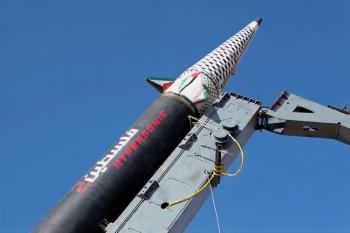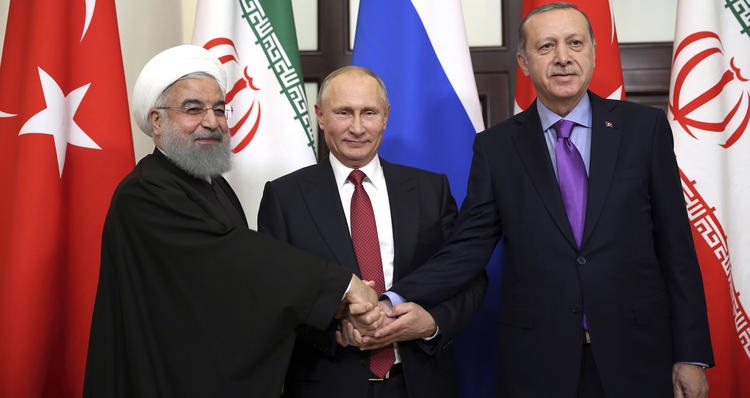Alwaght- The several-year Syrian crisis with its appalling and massive consequences in three domestic, regional, and international levels is nearing its end as the Syrian Army is dealing painful blows to ISIS terrorist group and triumphantly making advances on war fronts on the one hand and on the other hand Russia, Turkey, and Iran are pursuing Astana peace talks between the government and the opposition in a bid to contain the war and expand the safe zones across the country.
In the present conditions, the optimism about the negotiations between home and foreign actors of the Syrian conflict to reach an agreement on Syria’s future general political framework is stronger than ever.
Meanwhile, the Iranian and Turkish presidents hold a trilateral meeting on the Syria crisis in the Black Sea resort of Sochi in a bid to find a political solution to the devastating conflict, now in its seventh year.
Earlier, Ibrahim Kalin, the spokesman to the Turkish president, has described the three countries as the guarantors of the Syrian peace process, adding that the three leaders were to follow a procedure to work out a sustainable political settlement to the crisis. Moreover, Dmitry Peskov, the spokesman to the Russian president, on Monday said that the meeting of the three heads of state was to ensure a political solution, stability, and security.
On Sunday, the foreign ministers of Turkey, Russia, and Iran met in Antalya, Turkey to make the final preparations for the three presidents to meet in Russia. With regard to the success of trilateral cooperation for organizing seven rounds of Astana peace negotiations and their positive outcomes that revolved around restriction of war based on the mechanism of four de-escalation zones as well as the successful coordinated fight against the terrorist groups, the Sochi summit is having a significant role in determining the general track of the future developments in Syria, especially when it comes to dialogue between the warring sides.
Sochi summit before Geneva 8 conference
The key drive behind holding trilateral meeting is the upcoming Geneva peace talks which are scheduled to be held on November 28 under the supervision of the United Nations. Stephen de Mistura, the UN special envoy to Syria, has earlier said that the eighth round of the talks will concentrate on the elections and a new constitution for Syria.
The relation between the Sochi and Geneva meetings can be made clear if we consider the fact that the three countries' move to arrange Astana peace talks as a parallel model to the Geneva talks came as they saw the Geneva conference made no progress and also failed to be consistent with the three actors' views of the Syrian developments. So, the three countries, pessimistic about the Western-Arab arrangements for the Geneva dialogue, are seeking to reach an understanding on the general view of the issues on the strength of their upper hand on the battlefields before stepping in discussions on such important issues as the form of future Syrian political system, political transition mechanism, and a new constitution.
Earlier, the plan was to hold a conference titled “national Syrian dialogue congress, in Sochi to center on new constitution for the state with participation of representatives from various ethnic minorities, religious groups, and political factions of the opposition camp and the Syrian government. But the meeting was cancelled as Turkey opposed to the Kurds being invited.
With all these in mind, the general lines of a possible agreement between Moscow, Tehran, and Ankara can be as follows:
Combating terrorism and protecting Syrian territorial integrity
Discussing the last status of counterterror war in Syria and taking a joint stance to press ahead with cleansing the country of the terrorist and takfiri groups to facilitate return of security to the crisis-hit nation are the central point of the tripartite meeting. Determined to continue counterterrorism efforts, the three countries' army chief met on Tuesday in Sochi to negotiate ways to push ahead to this end. They talked about ways of fighting the terrorism in the region.
Over the past years of the Syrian war, the US along with its Arab allies like Saudi Arabia backed a long list of terrorist groups in a bid to overthrow the Syrian government led by President Bashar al-Assad. But their struggles were far from successful. When the Syrian Arab Army, backed by allied forces, took long steps to defeat the terror factions, the Western and Arab propagandistic media campaign started massively launching. The Aleppo recapture was one of the anti-terror triumphs that unleashed a heavy tide of anti-Damascus Western and Arab media blackening war.
“If regional nations and countries are to learn a lesson from the fabricated crisis in Syria today, it is that they should know certain powers claiming to advocate democracy and human rights spare no effort like using terrorism and violence to achieve their short-sighted objectives in the region,” Iranian President Hasan Rouhani said on Wednesday.
“The lesion that these powers have not learned is that repercussions of terrorism and extremism will not be confined to a region other parts of the world will not be safe from the ominous phenomena,” he added.
Moreover, facilitation of humanitarian aids and crisis settlement based on the United Nations Security Council’s Resolution 2254, which calls for respecting the Syrian sovereignty, is another part of the three leaders' agreement. After all, the three countries share the view about the need for Syria to remain united. Moscow and Tehran are struggling to prevent realization of American-Saudi plan to split Syria in service of the Israeli interests and also inflict damage on the Iranian-led Axis of Resistance. And Turkey is poised to protect Syrian territorial cohesion as it severely fears to see establishment of an autonomous Kurdish region on its southern borders with Syria. For Ankara, the US-Kurdish alliance often represents a continuous plot to deal blows to Turkey.
Assad's political fate
The key factor behind the opposite sides' failure to strike a deal in past rounds of talks was discord on the political future of President Assad. The Syrian leader, victoriously restoring under the government’s rule all of the formerly terrorist-held regions of the country thanks to alliance with Iran and Russia, now stands in a strong position. Tehran and Moscow as the staunch allies of Damascus as of yet have declined the opposition precondition of immediate Assad removal from power. They insist that the Syrian people through elections should decide on the fate of the current president. Turkey, once a key supporter of the Syrian opposition camp, after shift to cooperation with Russia and Iran has alluded to accepting Assad stay in power during transition. Prime Minister Binali Yidrim of Turkey in August 2016 maintained that Assad can have a role in the transitional period. By making this concession in its joint work with Tehran and Moscow, Ankara is trying to steer clear of Syria partition which might end in the Kurds setting up their autonomous government in Syria’s north and posing a fundamental threat to the Turkish national interests.



























